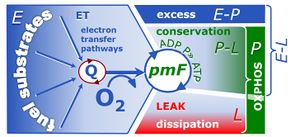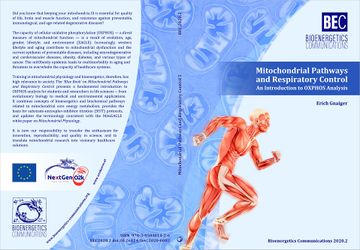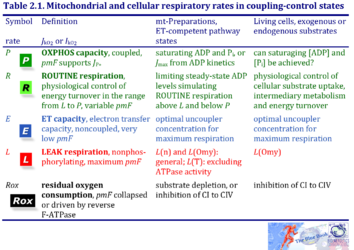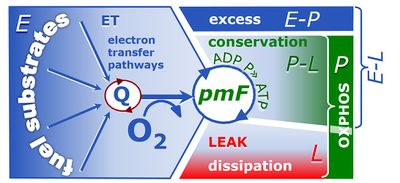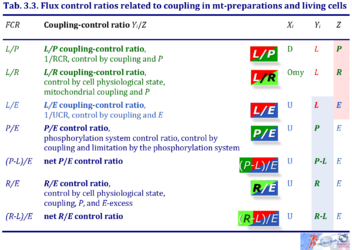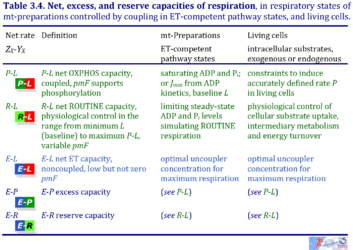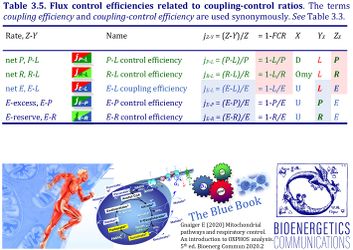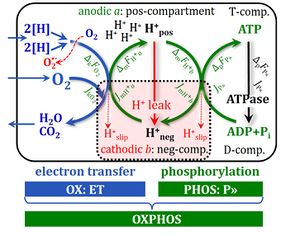Coupling-control state: Difference between revisions
No edit summary |
No edit summary |
||
| (16 intermediate revisions by 3 users not shown) | |||
| Line 1: | Line 1: | ||
{{MitoPedia | {{MitoPedia | ||
|abbr=''CCS'' | |abbr=''CCS'' | ||
|description='''Coupling control states''' are defined in [[mitochondrial preparations]] (isolated mitochondria, permeabilized cells, permeabilized tissues, homogenates) as [[LEAK]], [[OXPHOS]], and [[ET-pathway]] states, with corresponding respiration rates (''L, P, E'') in any [[electron transfer-pathway state]] which is competent for electron transfer. These coupling states are induced by application of specific inhibitors of the [[phosphorylation | |description='''Coupling-control states''' are defined in [[mitochondrial preparations]] (isolated mitochondria, permeabilized cells, permeabilized tissues, homogenates) as [[LEAK respiration]], [[OXPHOS]], and [[ET-pathway |ET]] states, with corresponding respiration rates (''L, P, E'') in any [[electron-transfer-pathway state]] which is competent for electron transfer. These coupling states are induced by titration of ADP and uncouplers, and application of specific inhibitors of the [[phosphorylation pathway]]. In [[living cells]], the coupling-control states are [[LEAK respiration]], [[ROUTINE]], and [[ET pathway |ET]] states of respiration with corresponding rates ''L, R, E'', using membrane-permeable inhibitors of the [[phosphorylation system]] (e.g. [[oligomycin]]) and [[uncoupler]]s (e.g. [[CCCP]]). [[Coupling-control protocol]]s induce these coupling-control states sequentially at a constant [[electron-transfer-pathway state]]. | ||
|info=[[Gnaiger 2009 Int J Biochem Cell Biol]] | |info=[[BEC 2020.1]], [[Gnaiger 2020 BEC MitoPathways]], [[Gnaiger 2009 Int J Biochem Cell Biol]] | ||
}} | }} | ||
[[File:EPL-net and excess.jpg|right|300px|thumb|[[Gnaiger 2020 BEC MitoPathways |Gnaiger 2020 BEC MitoPathways]]]] | |||
'''Coupling-control states:''' [[Image:P.jpg|link=OXPHOS capacity|OXPHOS capacity]] [[Image:R.jpg|link=ROUTINE respiration|ROUTINE respiration]] [[Image:E.jpg|link=ET capacity|ET capacity]] [[Image:L.jpg|link=LEAK respiration|LEAK respiration]] - [[Image:ROX.jpg|link=Residual oxygen consumption|ROX]] | |||
__TOC__ | |||
Communicated by [[Gnaiger E]] (2011-02-25) last update 2020-11-11. | |||
[[ | == [[SUITbrowser]] question: Coupling control == | ||
:::: [[Coupling-control protocol]]s are SUIT protocols that allow to analyze coupling control in [[living cells]] or [[mitochondrial preparations]]. | |||
:::: Use the [https://suitbrowser.oroboros.at/ SUITbrowser] to find the best protocol to answer this and other research questions. | |||
== References == | |||
{{#ask:[[Additional label::Coupling control]] | |||
| mainlabel=Bioblast link | |||
|?Has title=Reference | |||
|?Was published in year=Year | |||
|format=broadtable | |||
|limit=5000 | |||
|offset=0 | |||
|sort=Has title | |||
|order=ascending | |||
}} | |||
== Keywords == | |||
{{Template:Keywords: Coupling control}} | |||
{{Template:Keywords: Uncoupling}} | |||
{{MitoPedia concepts | {{MitoPedia concepts | ||
|mitopedia concept=MiP concept, Respiratory state, SUIT concept, SUIT state, Recommended | |mitopedia concept=MiP concept, Respiratory state, SUIT concept, SUIT state, Recommended | ||
Latest revision as of 18:58, 7 February 2021
Description
Coupling-control states are defined in mitochondrial preparations (isolated mitochondria, permeabilized cells, permeabilized tissues, homogenates) as LEAK respiration, OXPHOS, and ET states, with corresponding respiration rates (L, P, E) in any electron-transfer-pathway state which is competent for electron transfer. These coupling states are induced by titration of ADP and uncouplers, and application of specific inhibitors of the phosphorylation pathway. In living cells, the coupling-control states are LEAK respiration, ROUTINE, and ET states of respiration with corresponding rates L, R, E, using membrane-permeable inhibitors of the phosphorylation system (e.g. oligomycin) and uncouplers (e.g. CCCP). Coupling-control protocols induce these coupling-control states sequentially at a constant electron-transfer-pathway state.
Abbreviation: CCS
Reference: BEC 2020.1, Gnaiger 2020 BEC MitoPathways, Gnaiger 2009 Int J Biochem Cell Biol
Communicated by Gnaiger E (2011-02-25) last update 2020-11-11.
SUITbrowser question: Coupling control
- Coupling-control protocols are SUIT protocols that allow to analyze coupling control in living cells or mitochondrial preparations.
- Use the SUITbrowser to find the best protocol to answer this and other research questions.
References
Keywords
4-compartmental OXPHOS model. (1) ET capacity E of the noncoupled electron transfer system ETS. OXPHOS capacity P is partitioned into (2) the dissipative LEAK component L, and (3) ADP-stimulated P-L net OXPHOS capacity. (4) If P-L is kinetically limited by a low capacity of the phosphorylation system to utilize the protonmotive force pmF, then the apparent E-P excess capacity is available to drive coupled processes other than phosphorylation P» (ADP to ATP) without competing with P».
- Bioblast links: Coupling control - >>>>>>> - Click on [Expand] or [Collapse] - >>>>>>>
1. Mitochondrial and cellular respiratory rates in coupling-control states
| Respiratory rate | Defining relations | Icon | |
|---|---|---|---|
| OXPHOS capacity | P = P´-Rox | mt-preparations | |
| ROUTINE respiration | R = R´-Rox | living cells | |
| ET capacity | E = E´-Rox | » Level flow | |
| » Noncoupled respiration - Uncoupler | |||
| LEAK respiration | L = L´-Rox | » Static head | |
| » LEAK state with ATP | |||
| » LEAK state with oligomycin | |||
| » LEAK state without adenylates | |||
| Residual oxygen consumption Rox | L = L´-Rox |
2. Flux control ratios related to coupling in mt-preparations and living cells
| FCR | Definition | Icon | |
|---|---|---|---|
| L/P coupling-control ratio | L/P | » Respiratory acceptor control ratio, RCR = P/L | |
| L/R coupling-control ratio | L/R | ||
| L/E coupling-control ratio | L/E | » Uncoupling-control ratio, UCR = E/L (ambiguous) | |
| P/E control ratio | P/E | ||
| R/E control ratio | R/E | » Uncoupling-control ratio, UCR = E/L | |
| net P/E control ratio | (P-L)/E | ||
| net R/E control ratio | (R-L)/E |
3. Net, excess, and reserve capacities of respiration
| Respiratory net rate | Definition | Icon |
|---|---|---|
| P-L net OXPHOS capacity | P-L | |
| R-L net ROUTINE capacity | R-L | |
| E-L net ET capacity | E-L | |
| E-P excess capacity | E-P | |
| E-R reserve capacity | E-R |
4. Flux control efficiencies related to coupling-control ratios
| Coupling-control efficiency | Definition | Icon | Canonical term | ||
|---|---|---|---|---|---|
| P-L control efficiency | jP-L | = (P-L)/P | = 1-L/P | P-L OXPHOS-flux control efficiency | |
| R-L control efficiency | jR-L | = (R-L)/R | = 1-L/R | R-L ROUTINE-flux control efficiency | |
| E-L coupling efficiency | jE-L | = (E-L)/E | = 1-L/E | E-L ET-coupling efficiency » Biochemical coupling efficiency | |
| E-P control efficiency | jE-P | = (E-P)/E | = 1-P/E | E-P ET-excess flux control efficiency | |
| E-R control efficiency | jE-R | = (E-R)/E | = 1-R/E | E-R ET-reserve flux control efficiency |
5. General
- » Basal respiration
- » Cell ergometry
- » Dyscoupled respiration
- » Dyscoupling
- » Electron leak
- » Electron-transfer-pathway state
- » Hyphenation
- » Oxidative phosphorylation
- » Oxygen flow
- » Oxygen flux
- » Permeabilized cells
- » Phosphorylation system
- » Proton leak
- » Proton slip
- » Respiratory state
- » Uncoupling
- Bioblast links: Uncoupling - >>>>>>> - Click on [Expand] or [Collapse] - >>>>>>>
- Specific
- » Artefacts by single dose uncoupling
- » ATP synthase
- » CCCP
- » Coupling-control protocol
- » DNP
- » Dyscoupled respiration
- » FCCP
- » Is respiration uncoupled - noncoupled - dyscoupled?
- » Noncoupled respiration: Discussion
- » Uncoupler
- » Uncoupled respiration - see » Noncoupled respiration
- » Uncoupling proteins
- » Uncoupling protein 1
- » Uncoupler titrations - Optimum uncoupler concentration
- Specific
- Respiratory states and control ratios
- » Biochemical coupling efficiency
- » Coupling-control state
- » Electron-transfer-pathway state
- » Electron-transfer pathway
 ET capacity
ET capacity- » E-L coupling efficiency
- » Flux control efficiency
- » Flux control ratio
- » LEAK-control ratio
- » LEAK respiration
- » Noncoupled respiration
- » OXPHOS
- » OXPHOS capacity; » State 3
- » OXPHOS-control ratio, P/E ratio
- » Respiratory acceptor control ratio
- » ROUTINE-control ratio
- » ROUTINE respiration
- » ROUTINE state
- » State 3u
- » State 4
- » Uncoupling-control ratio UCR
- Respiratory states and control ratios
- Gnaiger E et al ― MitoEAGLE Task Group (2020) Mitochondrial physiology. Bioenerg Commun 2020.1. https://doi.org/10.26124/bec:2020-0001.v1
- Gnaiger E (2020) Mitochondrial pathways and respiratory control. An introduction to OXPHOS analysis. 5th ed. Bioenerg Commun 2020.2. https://doi.org/10.26124/bec:2020-0002
- General (alphabetical order)
- Other keyword lists
MitoPedia concepts:
MiP concept,
Respiratory state,
SUIT concept,
SUIT state,
Recommended
MitoPedia methods:
Respirometry
MitoPedia topics:
EAGLE

